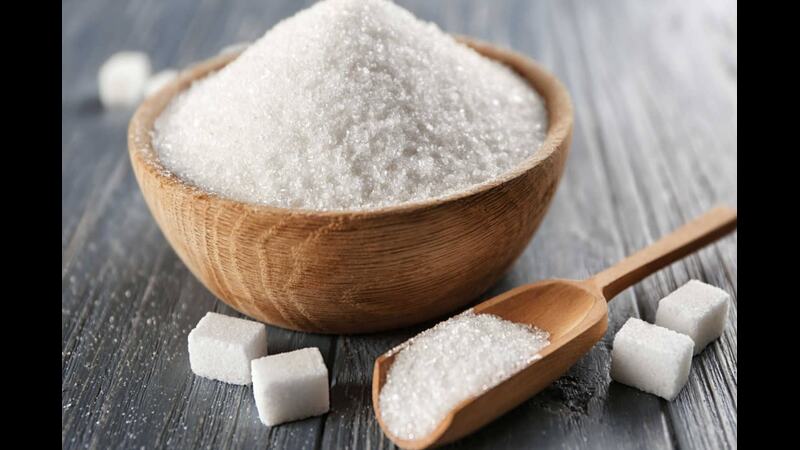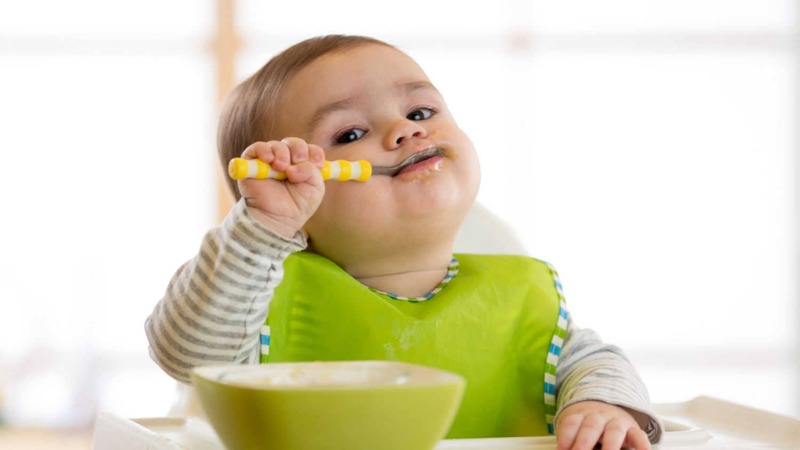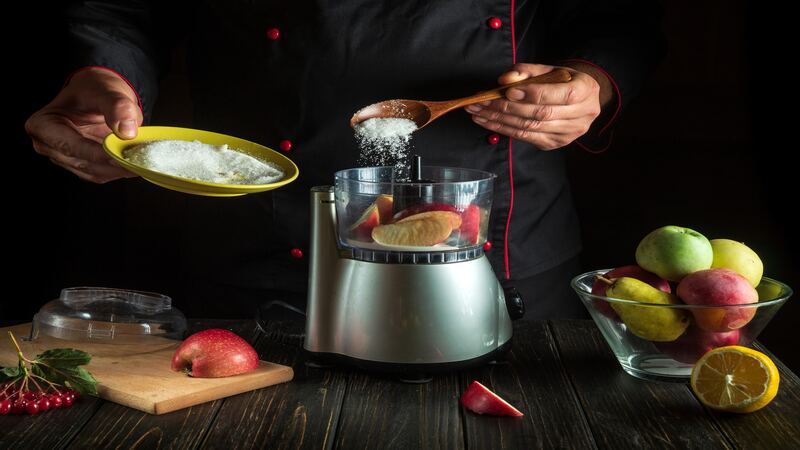
Sugar—what is it? Is it really important for us to consume? Is it healthy to eat sugar regularly? Do babies need sugar in their diet, and is it safe for them? Many questions arise when we think about sugar, and there is a wealth of information on the internet. The white substance we commonly consume, known as sugar, is scientifically referred to as sucrose. It is found in two forms: natural, as in fruits and milk, and artificial, such as table sugar, ice cream, and packaged juices. It is a carbohydrate naturally found in plants, especially sugarcane and sugar beets, from which it is extracted. (1). Some people use it in their baby’s feed, and some do not.
Sugar is present in all the foods in the form of other carbohydrates. It is also present in packaged and processed foods available in the market. It is available abundantly in every form. So is it safe to give sugar to babies? Does it cause any harm to the baby’s health? In this article, let us explore whether sugars are good or bad for babies’ health.
Is it Safe to Add Sugar to a Baby’s Food?
No, it is not advised to add sugars to a baby’s food. Some foods are not good for babies’ health, sugar is one of them.It is very important to eat healthy during pregnancy and after pregnancy when you are nursing your baby. And most important is to feed your baby healthy and nutritious food.
Often people think that if we are giving breast milk to the baby, we can also feed other foods to the baby as well. But that is not correct. Adding sugars to a baby’s food may impact the baby’s health. Sugar-containing foods can increase the risk of health diseases in the future. (2)
Why is Adding Sugar to Baby’s Food Popular?

Though it is not advisable to add sugar to a baby’s food, people do like to feed the baby with sugary food. This is because babies tend to develop a taste for sugar faster than other foods. Babies like sugary sweet tastes more than any other flavor. They are attracted to sweet flavors and accept the food easily, which is not the case with any other flavor of food.
It is also a ritual to give honey to newborn babies as a good omen. But it is not good to introduce sugar so early to the baby. If you are giving sugar once in a while, it will not affect the baby’s health. But if a baby’s food is full of sugar or sugar is consumed very often, it may lead to harmful consequences.
Are There Any Benefits of Adding Sugar to Baby Food?
No, sugar does not add any benefits to the baby’s food, as your baby does not need sugar from an outside source (3). These are just empty calories. The only sugar babies need is available in the breast milk in the form of lactose (milk sugar) and it is easy to digest by the baby without any issues. You should avoid sugary food because it can lead to tooth decay early on. It is advisable not to give sugar to babies in any form, not even honey, as it can cause food poisoning (3a).
According to ESPGHAN, there is no requirement for sugar in a baby’s food. They should consume it in natural form, like breast milk, fruits, and dates, but not in artificial foods like packed juices, smoothies, ice cream, etc. (4)
Disadvantages of Adding Sugar to Baby’s Food

Your baby needs no sugar at all. There is no requirement for artificial sugar as a nutrient, which is present in yogurt, ice cream, chocolates, etc. If the baby is consuming sugar in an unnatural form, it may result in :
- Tooth decay.
- Digestive issues, such as the baby’s stomach not being able to digest other foods effectively
- Increase the risk of infections as the baby’s immune function is not developed properly.
- Increase the risk of diseases in the future.
When Can You Safely Add Sugar to Baby’s Diet?
It is very important to know that it is not ideal to add anything to baby food other than the mother’s milk for the first six months. All the sugar that a baby needs is already present in the mother’s milk. The baby requires no sugar. (5). A six-month-old baby does not need extra food to fulfill the requirement. After six months the baby’s requirements increase, so the baby requires additional nutrition.
During this period mothers can start giving complementary food to infants, but there is no recommendation to add extra sugar to the baby’s diet. Sugar should be in the form of natural sugar, like in fruits or milk. Avoid adding food with sugars to the baby’s diet. (6) According to the CDC, children younger than 24 months old should avoid sugars in their diet. Even honey should not be given to babies who are not 12 months of age. (7).
How to Avoid Sugar in Packaged Foods?

It is always suggested to mothers to keep check on what she is giving to their baby. Always keep an eye on food labels. Always check for nutritional information to confirm that food does not contain added sugars or any flavored sugars. Do not give anything other than breast milk for the first six months. When starting complementary food after six months, always go for healthy options by choosing natural foods rather than packaged food. (7) Choose fresh 100% juice that comes from natural food.
The following are some foods to avoid to prevent unnecessary sugar in the food: (8)
- Candies, sugars, sugar-coated cereals.
- Yogurts, ice creams, frozen desserts, jellies, and gelatin desserts
- Processed packaged snacks
- Drinks with artificial sweeteners or other sugar substitutes.
- Avoid processed teas, coffees, and herbals.
Try to choose alternatives to sugars.
- Always add natural foods for sweetness like fruits.
- Choose foods written with no added sugars.
- Add different flavors to food so that the baby enjoys it.
FAQs
1. When Can I Start Adding Sugar to Baby Food?
According to the Centers for Disease Control and Prevention, babies should not be given sugar before 24 months. After reaching 2 years of age, the mother can give sugar to the child but within limits and preferably from natural sources. Always choose alternatives to sugar for your baby.
2. Is It Safe To Add Sugar To My Baby’s Porridge?
No, It is not safe to add sugar to a baby’s porridge. If it is in natural form, like fruits or milk, etc, it is good, but not the artificial one. Introducing sugar to the baby’s food at a very early stage may increase the risk of infections and diseases later on in life.
3. What Substitutes Can I Add to Sweeten My Baby’s Food?
There are multiple substitutes to add sweetness to baby food. Instead of sugar, you may add mashed dates, homemade applesauce, properly mashed bananas, raisins, etc. to baby food.
References
- Exploratorium, What is sugar? – https://www.exploratorium.edu/explore/cooking/sugar
- Fidler Mis N, Braegger C, Bronsky J, Campoy C, Domellöf M, Embleton ND, Hojsak I, Hulst J, Indrio F, Lapillonne A, Mihatsch W, Molgaard C, Vora R, Fewtrell M; ESPGHAN Committee on Nutrition:. Sugar in Infants, Children and Adolescents: A Position Paper of the European Society for Paediatric Gastroenterology, Hepatology and Nutrition Committee on Nutrition. J Pediatr Gastroenterol Nutr. 2017 Dec;65(6):681-696. – https://pubmed.ncbi.nlm.nih.gov/28922262/
- NHS, Foods to avoid giving babies and young children – https://www.nhs.uk/conditions/baby/weaning-and-feeding/foods-to-avoid-giving-babies-and-young-children/
- The ESPGHAN Committee on Nutrition – https://www.espghan.org/dam/jcr:9fdb9c21-494a-4237-9be7-303f68d8b0a2/2018_Sugar_Intake_in_Infants__Children_and_Adolescents.pdf
- UW Medicine | Newsroom News and information for journalists – https://newsroom.uw.edu/blog/ban-sugar-toddlers-new-guidance-urges-vigilance
- Medically reviewed by: Mary L. Gavin, MD – https://kidshealth.org/en/parents/solid-foods.html#
- Division of Nutrition, Physical Activity, and Obesity, National Center for Chronic Disease Prevention and Health Promotion – https://www.cdc.gov/nutrition/infantandtoddlernutrition/foods-and-drinks/foods-and-drinks-to-limit.html

